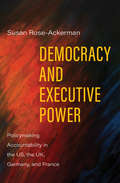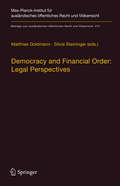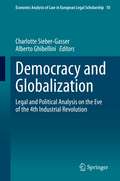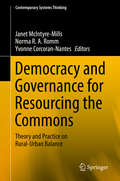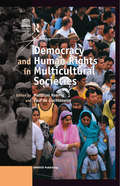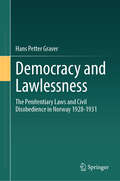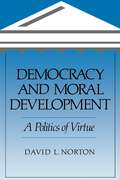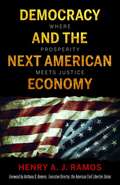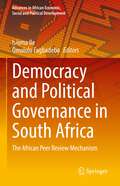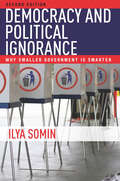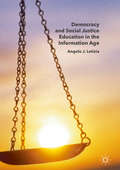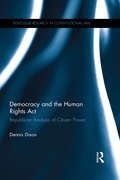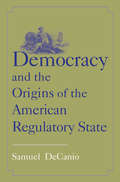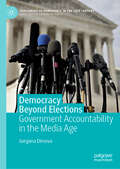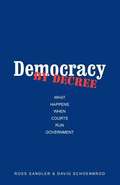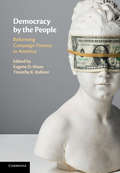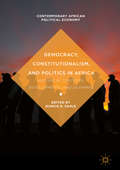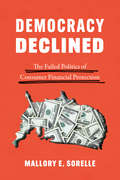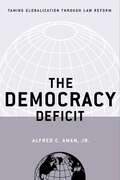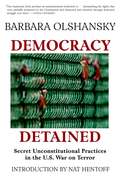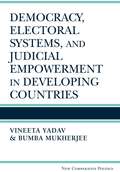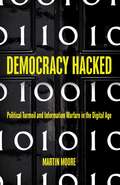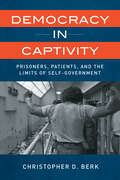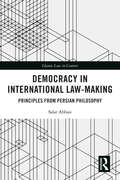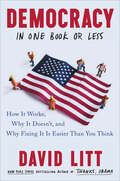- Table View
- List View
Democracy and Executive Power: Policymaking Accountability in the US, the UK, Germany, and France
by Susan Rose-AckermanA defense of regulatory agencies&’ efforts to combine public consultation with bureaucratic expertise to serve the interest of all citizens The statutory delegation of rule-making authority to the executive has recently become a source of controversy. There are guiding models, but none, Susan Rose-Ackerman claims, is a good fit with the needs of regulating in the public interest. Using a cross-national comparison of public policy-making in the United States, the United Kingdom, France, and Germany, she argues that public participation inside executive rule-making processes is necessary to preserve the legitimacy of regulatory policy-making.
Democracy and Financial Order: Legal Perspectives (Beiträge zum ausländischen öffentlichen Recht und Völkerrecht #273)
by Silvia Steininger Matthias GoldmannThis book discusses the relationship between democracy and the financial order from various legal perspectives. Each of the nine contributions adopts a unique perspective on the legal and political challenges brought to the fore by the Global Financial Crisis. This crisis and the ensuing sovereign debt crisis in Europe are only the latest in a long series of financial crises around the globe in recent decades. By their very existence, but also as a result of the political turmoil they have created, these financial crises testify to the well-known tensions between democracy and a market-based economic and financial order. However, what is missing in this debate is an analysis of the role of law for reconciling democracy with a market-based financial order. To fill this lacuna, the book focuses on the controversy surrounding the concept of law, thereby adding another variable to the debate on the relation between democracy and capitalism. Each chapter addresses the concept of law from a particular theoretical angle, be it a full-grown legal theory or an approach in political economy that has a particular view of the law.
Democracy and Globalization: Legal and Political Analysis on the Eve of the 4th Industrial Revolution (Economic Analysis of Law in European Legal Scholarship #10)
by Charlotte Sieber-Gasser Alberto GhibelliniThis book offers in-depth legal and political analysis concerning the compatibility of the Westphalian state model with globalization and the digital revolution. It explores the concept of democracy in a globalized world, discusses the legitimacy of economic integration in the global market, and presents three case studies (from Brazil, Taiwan and Spain) on the impact of social media on elections. It further entails novel perspectives on the impact of digitalization on national borders, and the role of citizens and experts in the shaping of globalization. A final chapter addresses the extent to which insights gained from the analysis of the abovementioned aspects will need to be considered in efforts to recover from the current global health and economic crisis.
Democracy and Governance for Resourcing the Commons: Theory and Practice on Rural-Urban Balance (Contemporary Systems Thinking)
by Yvonne Corcoran-Nantes Norma R. A. Romm Janet McIntyre-MillsThis book promotes the well-being of the commons through representation and accountability through monitoring from below in order to operationalize engagement. This book views the commons as a legal concept, a transformative governance concept, and a basis for systemic ethics. The chapters focus on practical responses to address complex problems that comprise many interrelated variables and are perceived differently by stakeholders with different values and life experiences. By considering these different stakeholders, the goal is to highlight ways to regenerate and invigorate employment opportunities. The book identifies pathways towards ethical vocational education to enable lifelong engagement by active citizens which requires action learning to address areas of perceived policy concern. Throughout the chapters in this book, the authors discuss transformative research and its implications on stakeholders. They focus on re-presentation and its implications for thinking and practice. One author makes the case for fostering non anthropocentric approaches to ethical development. In addition, the chapters cover case studies including governance challenges associated with water management using a mixed method approach and also production of mushrooms in collaboration with coffee growers in Jakarta. The book focuses on ways to de-colonialise knowledge formation in public policy and makes the case for an alternative approach to governance and democracy that takes into account a range of local people’s perspectives.
Democracy and Human Rights in Multicultural Societies
by Matthias Koenig Paul De GuchteneirePublished in association with UNESCO, Democracy and Human Rights in Multicultural Societies examines the political governance of cultural diversity, specifically how public policy-making has dealt with the claims for cultural recognition that have increasingly been expressed by ethno-national movements, language groups, religious minorities, indigenous peoples and migrant communities. Its principle aim is to understand, explain and assess public-policy responses to ethnic, linguistic and religious diversity. Adopting interdisciplinary perspectives of comparative social sciences, the contributors address the conditions, forms, and consequences of democratic and human-rights-based governance of multi-ethnic, multi-lingual and multi-faith societies.
Democracy and Lawlessness: The Penitentiary Laws and Civil Disobedience in Norway 1928-1931
by Hans Petter GraverThe book addresses efforts to politically influence and curb the judicial system, by telling the story of the enactment of controversial laws in Norway in 1927. It draws parallels to current challenges to the autonomy of the legal order, both in countries where populist forces seek control over the courts, and in other countries where increasing levels of conflict, such as around the climate crisis and the pandemic, challenge the rule of law. In 1927 the Norwegian Parliament enacted three laws that changes the rules of the game in the relation between Labor and Capital. The law was weaponized in benefit of the employers. By this, the legislature departed from the classic ideal of equality before the law and law’s autonomy as a neutral order. The new laws were called the penitentiary laws. The demonstrations against one of the laws, the Arbitration Act in 1928 were the largest manifestation of civil disobedience in Norwegian history. They provoked a level of lawlessness that has not been matched, with exception of the situation during the German occupation 1940-1945. The book analyses the events with the aid of the theory of civil disobedience in liberal democracies put forward by the philosopher John Rawls and the theory of the legal complex developed by the socio-legal scholars Terence Halliday, Lucien Karpic, and Malcolm Feeley. This book tells the story of the Penitentiary Laws, how the laws came into being, how they were received and resisted, and how they were defeated through civil disobedience and with the support of a legal complex which reached far into the legal system. The outcome of the conflict may be one of the factors that explain the high level of trust that the legal institutions enjoy in present day Norway.
Democracy and Moral Development: A Politics of Virtue
by David L. NortonAt a time when politics and virtue seem less compatible than oil and water, Democracy and Moral Development shows how to bring the two together. Philosopher David Norton applies classical concepts of virtue to the premises of modern democracy. The centerpiece of the book is a model of organizational management applicable to the state, business, the professions, and voluntary communities.
Democracy And The Next American Economy: Where Prosperity Meets Justice
by Henry A. J. RamosProgressive intellectual Henry A. J. Ramos believes the United States is at a crossroads, facing the most challenging moment since the civil rights movement of the late 1960s and early 1970s. In fact, absent major new interventions and investments, he sees this moment as a pivotal turning point in the American journey in which political polarization, income and wealth disparity and public violence"€"much of which is race related"€"threaten the very essence and integrity of our democracy and economy. Ramos examines the policies that have contributed to America's decline, including those that have led to the concentration of great wealth in the hands of a few while condemning many to systemic poverty and inequality. Current economic and social trends, he stresses, are unsustainable and call for organized, concerted action by people of conscience and those affected. <P><P> Ultimately, Ramos provides a roadmap for the future so the United States can continue to provide opportunities for its people and serve again as a leader in the international community. He offers case studies of organizations that have successfully created and administered programs that further equity in society, restore democratic practices, implement better urban and city planning and protect the environment. <P><P> Demonstrating both the critical importance and real possibility of leveraging prosperity and justice for all Americans, this compelling work is a must-read for anyone interested in democracy, economic restoration and environmental sustainability.
Democracy and Political Governance in South Africa: The African Peer Review Mechanism (Advances in African Economic, Social and Political Development)
by Omololu Fagbadebo Isioma IleThis book presents a holistic perspective and analysis of democratic practice, processes, and governance in South Africa. It examines the development in the South African governing system and its response to the challenges of the crisis of governance under the influence of the African Peer Review Mechanism (APRM). While doing so, the book's central objective is to examine the progress of the South African government in strengthening democracy and political governance. Each of the contributions follows a similar structure and addresses the following thematic issues: (1) Assessment of the implementation of the core APRM-related programs; (2) Identification of areas of excellence and prognosis for further improvement; (3) Identification of the weak areas of each and how to make the future implementation better, (4) Identification areas to improve democracy and political governance. A self-assessment strategy initiated by the African Union (AU) in 2002 and adopted in 2003, the APRM is a voluntary mechanism adopted by countries in the African continent to improve governance in general. As a specialized AU agency, APRM monitors the peer review activities of each African country. It serves as a tool for sharing experiences, reinforcing best practices, identifying deficiencies, and assessing capacity-building needs to foster policies, standards, and practices that lead to political stability, high economic growth, sustainable development, and accelerated sub-regional and continental economic integration. This book will be useful for and appeal to scholars and researchers in political science, public administration, and the social sciences in general, as well as policy-makers interested in a better understanding of democratic practice and processes, governance, public policy, and the African Peer Review Mechanism.
Democracy and Political Ignorance: Why Smaller Government Is Smarter, Second Edition
by Ilya SominOne of the biggest problems with modern democracy is that most of the public is usually ignorant of politics and government. Many people understand that their votes are unlikely to change the outcome of an election and don't see the point in learning much about politics. This creates a nation of people with little political knowledge and little ability to objectively evaluate what they do know. The second edition of Democracy and Political Ignorance fully updates its analysis to include new and vital discussions on the implications of the "Big Sort" for politics, the link between political ignorance and the disproportionate political influence of the wealthy, assessment of proposed new strategies for increasing political knowledge, and up-to-date survey data on political ignorance during recent elections. Ilya Somin mines the depths of the current state of ignorance in America and reveals it as a major problem for democracy. He weighs various options for solving this problem, provocatively arguing that political ignorance is best mitigated and its effects lessened by decentralizing and limiting government. People make better decisions when they have stronger incentives to acquire relevant information--and to use it wisely.
Democracy and Social Justice Education in the Information Age
by Angelo J. LetiziaThis book functions as a toolbox for preservice and veteran teachers, as well as teacher educators and professors who believe in and want to promote civic education in their classrooms. The book is comprised of eight methods. These methods focus on information location, evaluation and activation, dialogue in the classroom, understandings of discourse in popular culture and policymaking, understanding of the role of STEM disciplines in democracy, understandings of how the political process can provide meaning, new visions of justice in a globalized world, and student leadership and academic writing in the information age. All the methods call for students to create something, a paper, a project or an idea which can aid democracy. The book also outlines how teachers can evaluate these different creations.
Democracy and the Human Rights Act: Republican Analysis of Citizen Power (Routledge Research in Constitutional Law)
by Dennis DixonThis book discusses the extent to which the UK Human Rights Act successfully balances protection of rights and democracy. It is generally accepted that the Act prevents government from violating fundamental rights, but the extent to which the Act can legitimately be overridden as a result of public opinion and participation is less clear. The work considers the Act’s effect on this popular element of the British Constitution. It uses analytical tools from republican political theory to explore the claim that the Act achieved a reconciliation between the protection of rights and democracy. In particular, it employs republican analysis of domination to consider how the Human Rights Act could operate so that public opinion invigilates legislative responses to judicial decisions. The key question is whether judicial decisions under the Human Rights Act serve to ‘remove, reduce or replace’ opportunities for the electorate to control judicial decision-making, remembering always that the electorate is seldom engaged in politics, but should it choose to, its ability to do so is at the heart of democracy. The study also examines the difficulty of isolating national constitutional forms where bills of rights are internationalised as with the European Convention on Human Rights. The book will be a valuable resource for students and academics researching constitutional legal theory and comparative constitutional law. While the focus is on the UK HRA, broader theoretical issues of constitutional review will have significant international interest and relevance to domestic debates on a British Bill of Rights.
Democracy and the Origins of the American Regulatory State
by Samuel DecanioPolitical scientist Samuel DeCanio examines how political elites used high levels of voter ignorance to create a new type of regulatory state with lasting implications for American politics. Focusing on the expansion of bureaucratic authority in late-nineteenth-century America, DeCanio's exhaustive archival research examines electoral politics, the Treasury Department's control over monetary policy, and the Interstate Commerce Commission's regulation of railroads to examine how conservative politicians created a new type of bureaucratic state to insulate policy decisions from popular control.
Democracy Beyond Elections: Government Accountability in the Media Age (Challenges to Democracy in the 21st Century)
by Gergana DimovaThis book provides the analytical framework for understanding the relationship between media scandals, executive accountability and the crisis of democracy. The empirical findings are based on an original database of 6000 media allegations and investigations in Russia, Germany and Bulgaria. Observations gained from the case studies are then placed in relation to a systematic analysis and critique of more than 100 models of the transformation and crisis of democracy. The book will be of particular interest to researchers focusing on democratic theory and political thought, as well as those working empirically in the field of democratic systems.
Democracy By Decree: What Happens When Courts Run Government
by Ross Sandler David SchoenbrodThis valuable book explains why schools, welfare agencies, and other important state and local institutions have come to be controlled by attorneys and judges rather than by governors and mayors. The authors discuss why this has resulted in worse service to the public and what can be done to restore control of these programs to elected—and accountable—officials.
Democracy by the People: Reforming Campaign Finance in America
by Eugene D. Mazo Timothy K. KuhnerThanks to a series of recent US Supreme Court decisions, corporations can now spend unlimited sums to influence elections, Super PACs and dark money groups are flourishing, and wealthy individuals and special interests increasingly dominate American politics. Despite the overwhelming support of Americans to fix this broken system, serious efforts at reform have languished. Campaign finance is a highly intricate and complex area of the law, and the current system favors the incumbent politicians who oversee it. This illuminating book takes these hard realities as a starting point and offers realistic solutions to reform campaign finance. With contributions from more than a dozen leading scholars of election law, it should be read by anyone interested in reclaiming the promise of American democracy.
Democracy, Constitutionalism, and Politics in Africa
by Eunice N. SahleThis volume explores contemporary political developments in various parts of Africa in the age of democracy, constitutionalism, the securitization of development, and global terrorism. The contributions by leading observers of constitutionalism and African politics in the context of a global political and economic system provide a nuanced understanding of important themes in contemporary African politics: constitutionalism, democratic politics and governance, women's rights, the African Union, securitization of development, civil society, and debates concerning global terrorism and the war on terror. As such, it will be of great interest to scholars, civil society organizations, and public policy makers interested in contemporary African politics.
Democracy Declined: The Failed Politics of Consumer Financial Protection (Chicago Studies in American Politics)
by Mallory E. SoRelleAs Elizabeth Warren memorably wrote, “It is impossible to buy a toaster that has a one-in-five chance of bursting into flames and burning down your house. But it is possible to refinance an existing home with a mortgage that has the same one-in-five chance of putting the family out on the street.” More than a century after the government embraced credit to fuel the American economy, consumer financial protections in the increasingly complex financial system still place the onus on individuals to sift through fine print for assurance that they are not vulnerable to predatory lending and other pitfalls of consumer financing and growing debt. In Democracy Declined, Mallory E. SoRelle argues that the failure of federal policy makers to curb risky practices can be explained by the evolution of consumer finance policies aimed at encouraging easy credit in part by foregoing more stringent regulation. Furthermore, SoRelle explains how angry borrowers’ experiences with these policies teach them to focus their attention primarily on banks and lenders instead of demanding that lawmakers address predatory behavior. As a result, advocacy groups have been mostly unsuccessful in mobilizing borrowers in support of stronger consumer financial protections. The absence of safeguards on consumer financing is particularly dangerous because the consequences extend well beyond harm to individuals—they threaten the stability of entire economies. SoRelle identifies pathways to mitigate these potentially disastrous consequences through greater public participation.
The Democracy Deficit: Taming Globalization Through Law Reform
by Alfred C. Aman Jr.Economic globalization has had a chilling effect on democracy since markets now do some of the work that governments used to do through the political process. More than two decades of deregulation have made a healthy economy appear to depend on unrestrained markets. But appearances are misleading—globalization is also a legal and political process. The future of democracy in the twenty-first century depends on the ability of citizens to reclaim a voice in taming globalization through domestic politics and law reform. "The book's topic could not be more important: how do we adapt contemporary democratic governance- and contemporary administrative law- to the challenge of a globalizing world?"—Kal Raustiala, UCLA School of Law Can citizens govern globalization? Aman argues that they can, and that domestic law has a crucial role to play in this process. He proposes to redefine the legal distinction between public and private to correspond to the realities of the new role of the private sector in delivering public services, and thereby to bring crucial sectors of globalization back within the scope of democratic reform. Basing his argument on the history of the policies that led to globalization, and the current policies that sustain it, Aman advocates specific reforms meant to increase private citizens' influence on globalization. He looks at particular problem areas usually thought to be domestic in nature, such as privatization, prisons, prescription drugs, and the minimum wage, as well as constitutional structural issues such as federalism and separation of powers.
Democracy Detained: Military Tribunals and the Threat to Democracy
by Barbara Olshansky Nat HentoffDemocracy Detained exposes the deplorable secret crimes committed by the Bush administration in their war on terror. Prominent legal activist Barbara Olshansky documents the assault on our constitutional democracy since 9/11, meticulously analyzing the unlawful justifications made by the U.S. government for covert actions at home and abroad. She reports on current shocking practices, from the outsourcing of torture through extraordinary rendition, to first-person testimony from innocent men imprisoned without charge at Guantánamo Bay, to revelations of a surveillance network tapped into the homes of average citizens. Democracy Detained is an essential resource for Americans concerned about their civil rights.
Democracy, Electoral Systems, And Judicial Empowerment In Developing Countries
by Vineeta Yadav Bumba MukherjeeThe power granted to the courts, both in a nation’s constitution and in practice, reveals much about the willingness of the legislative and executive branches to accept restraints on their own powers. For this reason, an independent judiciary is considered an indication of a nation’s level of democracy. Vineeta Yadav and Bumba Mukherjee use a data set covering 159 developing countries, along with comparative case studies of Brazil and Indonesia, to identify the political conditions under which de jure independence is established. They find that the willingness of political elites to grant the courts authority to review the actions of the other branches of government depends on the capacity of the legislature and expectations regarding the judiciary’s assertiveness. Moving next to de facto independence, Yadav and Mukherjee bring together data from 103 democracies in the developing world, complemented by case studies of Brazil, India, and Indonesia. Honing in on the effects of electoral institutions, the authors find that, when faced with short time horizons, governments that operate in personal vote electoral systems are likely to increase de facto judicial independence whereas governments in party-centered systems are likely to reduce it.
Democracy Hacked: How Technology is Destabilising Global Politics
by Martin MooreTechnology has fractured democracy, and now there&’s no going back. All around the world, the fringes have stormed the palace of the elites and unleashed data miners, dark ads and bots on an unwitting public. After years of soundbites about connecting people, the social media giants are only just beginning to admit to the scale of the problem. We stand on the precipice of an era where switching your mobile platform will have more impact on your life than switching your government. Where freedom and privacy are seen as incompatible with social well-being and transparency. Where your attention is sold to the highest bidder. Our laws don&’t cover what is happening and our politicians don&’t understand it. But if we don&’t fight to change the system now, we may not get another chance.
Democracy in Captivity: Prisoners, Patients, and the Limits of Self-Government
by Christopher D. BerkWho ought to govern those held in custody, and by what right? Democracy in Captivity examines various efforts to answer these questions, centering on two case studies at custodial institutions: the rise and demise of patient self-governance at St. Elizabeths Hospital in Washington, DC, between 1947 and 1965 and the prisoner-organized governance of Massachusetts's Walpole State Prison following a 1973 prison-guard strike. As Christopher D. Berk shows, the promise of these initiatives was tempered by the custodians' backlash to their wards' attempts at self-rule. This backlash arrived not only in the blunt forms of restraint chairs, riot gear, and a surgeon's scalpel but also as more covert measures taken under the cover of so-called democratic management—which in turn entrenched disenfranchisement and naturalized authoritarian rule. Turning from these case studies to a wider consideration of custody and democracy, Berk explores pathologies that have captured the politics of punishment, with pressing implications for the practice of democracy both inside and outside custodial institutions.
Democracy in International Law-Making: Principles from Persian Philosophy (Islamic Law in Context)
by Salar AbbasiThis book provides a critique of current international law-making and draws on a set of principles from Persian philosophers to present an alternative to influence the development of international law-making procedure. The work conceptualizes a substantive notion of democracy in order to regulate international law-making mechanisms under a set of principles developed between the twelfth and seventeenth centuries in Persia. What the author here names ‘democratic egalitarian multilateralism’ is founded on: the idea of ‘egalitarian law’ by Suhrawardi, the account of ‘substantial motion’ by Mulla Sadra, and the ideal of ‘intercultural dialectical democracy’ developed by Rūmī. Following a discussion of the conceptual flaws of the chartered and customary sources of international law, it is argued that ‘democratic egalitarian multilateralism’ could be a source for a set of principles to regulate the procedures through which international treaties are made as well as a criterion for customary international law-ascertainment. Presenting an alternative, drawn from a less dominant culture, to the established ideas of international law-making the book will be essential reading for researchers and academics working in public international law, history of law, legal theory, comparative legal theory, Islamic law, and history.
Democracy in One Book or Less: How It Works, Why It Doesn't, and Why Fixing It Is Easier Than You Think
by David LittNew York Times–Bestselling Author: &“Brings Dave Barry-style humor to an illuminating book on what is wrong with American democracy—and how to put it right.&” —The Washington Post The democracy you live in today is different—completely different—from the democracy you were born into. You probably don't realize just how radically your republic has been altered during your lifetime. Yet more than any policy issue, political trend, or even Donald Trump himself, our redesigned system of government is responsible for the peril America faces today. What explains the gap between what We, the People want and what our elected leaders do? How can we fix our politics before it's too late? And how can we truly understand the state of our democracy without wanting to crawl under a rock? That&’s what former Obama speechwriter David Litt set out to answer. Poking into forgotten corners of history, translating political science into plain English, and traveling the country to meet experts and activists, Litt explains how the world&’s greatest experiment in democracy went awry. (He also tries to crash a party at Mitch McConnell&’s former frat house. It goes poorly.) The result is something you might not have thought possible: an unexpectedly funny page-turner about the political process. You&’ll meet the Supreme Court justice charged with murder, learn how James Madison&’s college roommate broke the Senate, encounter a citrus thief who embodies what&’s wrong with our elections, and join Belle the bill as she tries to become a law (a quest far more harrowing than the one in Schoolhouse Rock!). Yet despite his clear-eyed assessment of the dangers we face, Litt remains audaciously optimistic. He offers a to-do list of bold yet achievable changes—a blueprint for restoring the balance of power in America. &“In the book&’s strongest contribution, Litt shows how radically our democracy has been altered in recent decades . . . [making] the case that nearly all of these negative trends are occurring by design.&” —The Washington Post &“Wry, quickly readable, yet informed.&” —The Atlantic &“Equal parts how-to, historical, and hilarious.&” —Keegan-Michael Key
